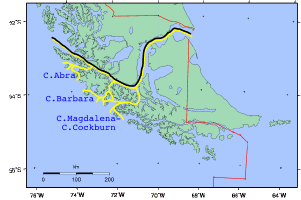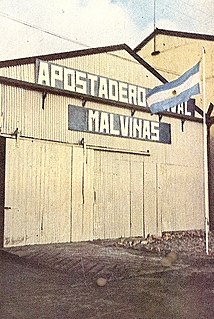
Malvinas Argentinas Ushuaia International Airport is located 4 km (2.5 mi) south of the center of Ushuaia, a city on the island of Tierra del Fuego in the Tierra del Fuego Province of Argentina.

Tierra del Fuego, officially the Province of Tierra del Fuego, Antarctica and South Atlantic Islands, is the southernmost, smallest, and least populous Argentine province.

Picton, Lennox and Nueva form a group of three islands at the extreme southern tip of South America, in the Chilean commune of Cabo de Hornos in Antártica Chilena Province, Magallanes and Antártica Chilena Region. Located in the Tierra del Fuego archipelago, they lie east of Navarino Island and are separated from the Argentine part of Isla Grande in the north by the Beagle Channel. They have an area of 170.4 km2 (Lennox), 105.4 km2 (Picton), 120.0 km2 (Nueva).

The Beagle conflict was a border dispute between Chile and Argentina over the possession of Picton, Lennox and Nueva islands and the scope of the maritime jurisdiction associated with those islands that brought the countries to the brink of war in 1978.

Rosario – Islas Malvinas International Airport, formerly known as Fisherton International Airport, is located 13 km (8.1 mi) west-northwest from the center of Rosario, a city in the Santa Fe Province of Argentina. The airport covers an area of 550 ha and is operated by the Province of Santa Fe.
Sovereignty over the Falkland Islands is disputed by Argentina and the United Kingdom. The British claim to sovereignty dates from 1690, when they made the first recorded landing on the islands, and the United Kingdom has exercised de facto sovereignty over the archipelago almost continuously since 1833. Argentina has long disputed this claim, having been in control of the islands for a few years prior to 1833. The dispute escalated in 1982, when Argentina invaded the islands, precipitating the Falklands War.

Malvinas Day, officially Day of the Veterans and Fallen of the Malvinas War, is a public holiday in Argentina, observed each year on 2 April. The name refers to the Falkland Islands, known in Spanish as the Islas Malvinas.
There were many events leading to the 1982 Falklands War between the United Kingdom and Argentina over possession of the Falkland Islands and South Georgia.

International relations between the Republic of Chile and the Argentine Republic have existed for decades. Argentina and Chile share the world's third-longest international border, which is 5,300 km (3,300 mi) long and runs from north to south along the Andes mountains. Although both countries gained their independence during the South American wars of liberation, during much of the 19th and the 20th century, relations between the countries were chilled as a result of disputes over the border in Patagonia. Despite this, Chile and Argentina have never been engaged in a war with each other. In recent years, relations have improved dramatically in spite of social differences. Despite increased trade between the two countries, Argentina and Chile have followed quite different economic policies. Chile has signed free trade agreements with countries such as China, the US, Canada, South Korea, and the EU, and is an active member of the APEC, while Argentina belongs to the Mercosur regional free trade area. In April 2018, both countries suspended their membership from the UNASUR.
The direct negotiations between Chile and Argentina about the islands and maritime rights in Beagle conflict began after the Queen Elizabeth II of the United Kingdom announced on 2 May 1977 the judgement of the Beagle Channel Arbitration to the governments of both countries. The court ruled that the islands and all adjacent formations belonged to Chile. The direct negotiations finished with the Act of Montevideo on 9 January 1979, where both countries accept the papal mediation after Argentina's call off of the Operation Soberanía. This was the most dangerous phase of the Beagle Conflict and there was a real possibility of open warfare.

The Papal mediation in the Beagle conflict followed the failure of negotiations between Chile and Argentina, when, on 22 December 1978, the Argentinian Junta started Operation Soberanía, to invade Cape Horn and islands awarded to Chile by the Beagle Channel Arbitration. Soon after the event, Pope John Paul II offered to mediate and sent his personal envoy, Cardinal Antonio Samoré, to Buenos Aires. Argentina, in acceptance of the authority of the Pope over the overwhelmingly Catholic Argentine population, called off the military operation and accepted the mediation. On 9 January 1979, Chile and Argentina signed the Act of Montevideo formally requesting mediation by the Vatican and renouncing the use of force.

Commodore Augusto Lasserre (1826-1906) was an officer in the Argentine Navy. He was born in 1826 in Montevideo. Lasserre was promoted to the rank of captain on the 11 June 1852. Later he was promoted to Commander of the Argentine Navy.

The Argentine Military Cemetery, Spanish: Cementerio de Darwin, is a military cemetery on East Falkland that holds the remains of 236 Argentine combatants killed during the 1982 Falklands War. It is located at Fish Creek to the east of the Darwin Settlement the location of the Battle of Goose Green. There is a replica of the cemetery at Berazategui in Buenos Aires Province, Argentina.
Lobos is the partido capital of Lobos Partido in Buenos Aires Province, Argentina.
In the late 1840s, the Argentine Confederation attempted to regulate traffic on the Paraná and Uruguay rivers, which impacted upon Anglo-French trade with the landlocked Paraguay. As a result, Britain and France took military action in the blockade of the Río de la Plata. Although militarily successful, the victories against Argentine forces proved somewhat pyrrhic and both withdrew their forces and made treaties with Argentina. The peace treaty with the British is referred to as the Convention of Settlement; or the Arana–Southern Treaty.
Malvinas Argentinas Partido is a partido (county) in Buenos Aires Province, Argentina.

The hijacking of Aerolíneas Argentinas Flight 648 occurred on 28 and 29 September 1966 when a group of Argentine nationalists hijacked a civilian Aerolíneas Argentinas aircraft en route from Buenos Aires to Río Gallegos and forced the captain at gunpoint to land in the Falkland Islands in protest to the UK's presence on the islands. After landing, the hijackers raised the Argentine flag, took several islanders hostage and demanded the Governor of the Falkland Islands recognise Argentine sovereignty over the islands. On 29 September 1966, after negotiating through a Catholic priest, the hijackers surrendered and were returned to Argentina for trial.

María Sáez Pérez de Vernet was the wife of Luis Vernet. She wrote a personal diary during her residence in Port Louis, Falkland Islands, which was preserved together with other documents and letters in the Argentine National Archive when her husband's papers were donated to the Argentine National Archive.

Eduardo Alejandro Roca was an Argentine lawyer, academic, and diplomat. He was Ambassador of Argentina to the United States (1968–1970) and was appointed as a permanent representative to the United Nations during the 1982 Falklands War.

The Falklands Naval Station was the main base of the naval component of Argentina in the Falklands Islands, during the South Atlantic conflict of 1982.













